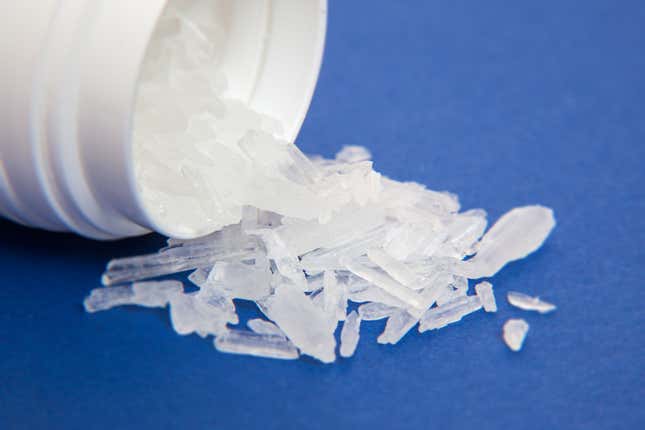
As the U.S. prepares for a coronavirus outbreak that appears all but inevitable, the onus is on government officials at all levels to spread accurate information that relays the seriousness of the situation while also allaying unfounded fears or panic.
Apparently, someone forgot to tell the cops this.
Police departments across the country have been posting false information on social media in the form of “jokes”—telling people that if they recently purchased methamphetamines, it may be laced with the coronavirus.
One department in Merrill, Wisc., posted such an update, volunteering to “test” the meth for free.
“If you’re not comfortable going into an office setting, please request any officer and they’ll test your meth in the privacy of your home,” the Merrill Police Department posted on Wednesday. “Please spread the word! We are here for you!”
The post was clearly intended as a joke—the sort of humor cops try to employ to “humanize” their departments on the cheap (versus, say, changing their policies, behaviors, or hiring practices). Merrill wasn’t alone either; similar posts popped up from police departments in Arkansas, Texas, Florida and Kansas. But the context of the joke is key here: Moody’s Analytics recently recalculated the chances the coronavirus could evolve into a global pandemic from 20 percent to 40 percent. With a global health crisis at stake, it’s important for people to be armed with credible information. And it’s equally as important for state and local governments—from whom we will be receiving instructions about how to best protect ourselves during an outbreak—to be credible.
One expert who spoke to the Washington Post contextualized the police department’s “joke: this way:
Ted Gideonse, a professor at the University of California at Irvine’s Program in Public Health, who specializes in substance abuse and public health ethics, said he doubts many would fall for the trap. But the problem with fake news coming straight from a police department is that these “stories end up getting lives of their own,” existing “in the underbelly of the Internet where people don’t actually question things.”
“The last thing we need to do is have people in the local public health departments having to deal with disinformation campaigns coming from their actual colleagues as opposed to social media or bad TV journalism,” he said.
People may know not to bring meth to a police department, but the idea that illicit substances could be laced with the virus could stick—and as the Post noted, several local TV news outlets ran stories about police “testing” meth for coronavirus “without a hint of skepticism”. This isn’t the first time police departments have spread this kind of disinformation—and reaped the benefits of people’s gullibility.
In 2016, police in Granite Shoals, Texas published a similar PSA claiming that drugs could be contaminated with Ebola. One woman did end up going to the police, concerned that her drugs could be laced. She was arrested and charged with possessing less than one gram of a controlled substance, according to the San Antonio Express-News.
Public health officials—and we, as citizens—have the challenge of holding multiple ideas at the same time: that we have to take these health risks seriously, that there is still more we need to learn about the coronavirus, and that spinning out into panic can be just as dangerous as being blithe about the health risks (fear, after all, is easily weaponized).
As Jing Zeng wrote for The Guardian, there are reports worldwide of Chinese communities being attacked and harassed in the wake of the Covid-19 outbreak. In Australia, patients have refused to let doctors or nurses of Asian descent treat their children.
In the U.S., where nativism and white nationalism have been on the rise in recent years, fear of infectious diseases has historically been used to target already marginalized groups. From the Guardian:
For instance, during the 1853 yellow fever epidemic in America, Irish and German immigrants were blamed as the cause. In the 1916 major outbreak of polio in New York City, Italian immigrants were accused of bringing the epidemic to the US.
Our history points to the urgent need for serious, sober responses to health crises to keep all our communities safe. The Merrill Police Department isn’t alone in their buffoonery, and their response to their corona virus post—after receiving backlash—doesn’t exactly read as apologetic.
MPD explained that people actually do report drugs being stolen or ripped off to the police, and thus defended their post—“This attempt, although a long shot, still had some possibility behind it.
“We will take those easy grabs at removing poison from our community whenever we can. That is our role which we un-apologetically must fill,” the department continued. “It is our hope that every drug arrest both works to hold offenders accountable for their deeds and provides them with a path toward treatment options.”
There are ways to help addicts that don’t involve arrests, of course (oh, to live in a world where the cops themselves can admit that!). But at this point in time it’s important to remember one more thing: policing has caused more death and more community harm than the corona virus has in the U.S. thus far, and this sort of self-righteous disinformation masquerading as public good does nothing to keep us, as a country, safer.



